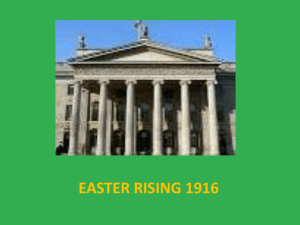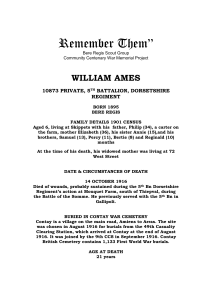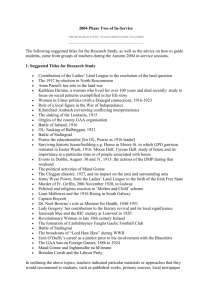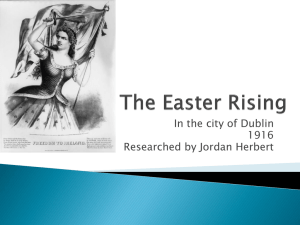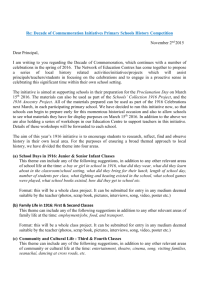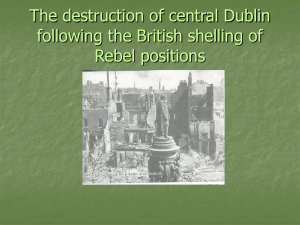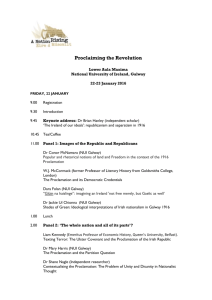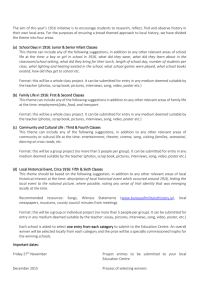Extracts-from-biography-of-Yeats-for-1916-by-Roy
advertisement
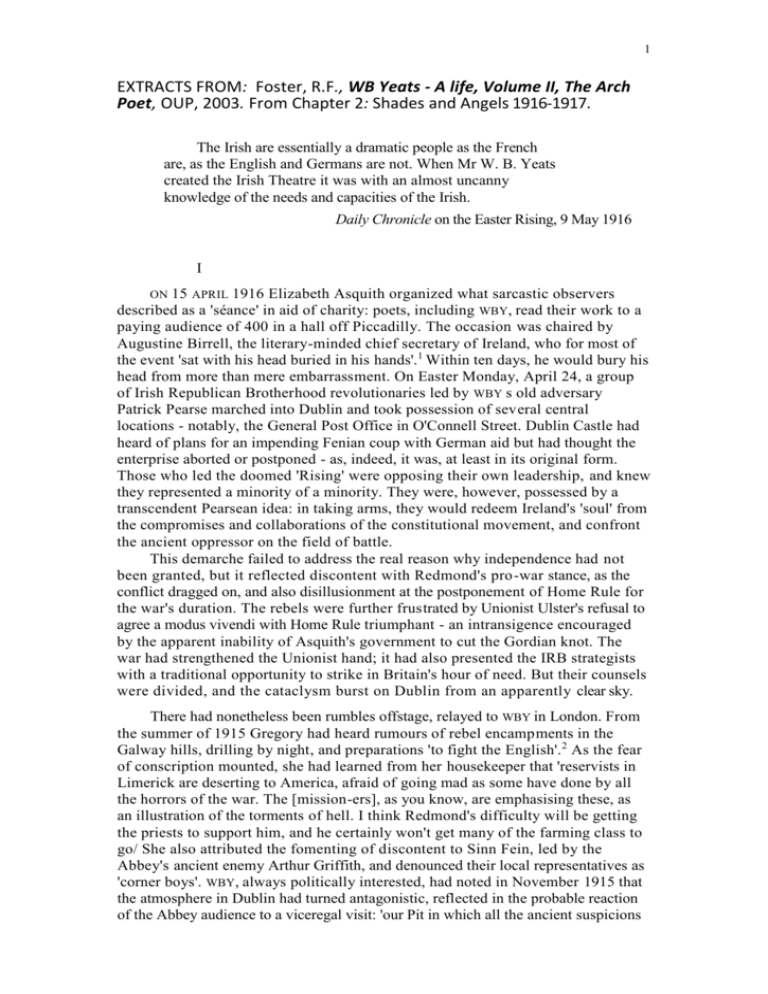
1
EXTRACTS FROM: Foster, R.F., WB Yeats - A life, Volume II, The Arch
Poet, OUP, 2003. From Chapter 2: Shades and Angels 1916-1917.
The Irish are essentially a dramatic people as the French
are, as the English and Germans are not. When Mr W. B. Yeats
created the Irish Theatre it was with an almost uncanny
knowledge of the needs and capacities of the Irish.
Daily Chronicle on the Easter Rising, 9 May 1916
I
ON 15 APRIL 1916 Elizabeth Asquith organized what sarcastic observers
described as a 'séance' in aid of charity: poets, including WBY, read their work to a
paying audience of 400 in a hall off Piccadilly. The occasion was chaired by
Augustine Birrell, the literary-minded chief secretary of Ireland, who for most of
the event 'sat with his head buried in his hands'.1 Within ten days, he would bury his
head from more than mere embarrassment. On Easter Monday, April 24, a group
of Irish Republican Brotherhood revolutionaries led by WBY s old adversary
Patrick Pearse marched into Dublin and took possession of several central
locations - notably, the General Post Office in O'Connell Street. Dublin Castle had
heard of plans for an impending Fenian coup with German aid but had thought the
enterprise aborted or postponed - as, indeed, it was, at least in its original form.
Those who led the doomed 'Rising' were opposing their own leadership, and knew
they represented a minority of a minority. They were, however, possessed by a
transcendent Pearsean idea: in taking arms, they would redeem Ireland's 'soul' from
the compromises and collaborations of the constitutional movement, and confront
the ancient oppressor on the field of battle.
This demarche failed to address the real reason why independence had not
been granted, but it reflected discontent with Redmond's pro-war stance, as the
conflict dragged on, and also disillusionment at the postponement of Home Rule for
the war's duration. The rebels were further frustrated by Unionist Ulster's refusal to
agree a modus vivendi with Home Rule triumphant - an intransigence encouraged
by the apparent inability of Asquith's government to cut the Gordian knot. The
war had strengthened the Unionist hand; it had also presented the IRB strategists
with a traditional opportunity to strike in Britain's hour of need. But their counsels
were divided, and the cataclysm burst on Dublin from an apparently clear sky.
There had nonetheless been rumbles offstage, relayed to WBY in London. From
the summer of 1915 Gregory had heard rumours of rebel encampments in the
Galway hills, drilling by night, and preparations 'to fight the English'.2 As the fear
of conscription mounted, she had learned from her housekeeper that 'reservists in
Limerick are deserting to America, afraid of going mad as some have done by all
the horrors of the war. The [mission-ers], as you know, are emphasising these, as
an illustration of the torments of hell. I think Redmond's difficulty will be getting
the priests to support him, and he certainly won't get many of the farming class to
go/ She also attributed the fomenting of discontent to Sinn Fein, led by the
Abbey's ancient enemy Arthur Griffith, and denounced their local representatives as
'corner boys'. WBY, always politically interested, had noted in November 1915 that
the atmosphere in Dublin had turned antagonistic, reflected in the probable reaction
of the Abbey audience to a viceregal visit: 'our Pit in which all the ancient suspicions
2
are alive again in all probability will either desert the theatre or boo the viceroy'. A
month later he told Gregory that nationalists were now interfering with the mail of
well-known Unionist sympathizers, like the land commissioner and Abbey trustee
W. F. Bailey. 3 But neither he nor Gregory, in common with the doomed Birrell
and most of the Irish population, expected the Rising to happen as and when it did.
Misinformation was general. Griffith in fact had opposed the idea of a
Rising, as had the Volunteer leader Eoin MacNeill, and been kept in ignorance; the
leadership came from a dissident IRB wing, not from Sinn Fein as such. But as
Dublin blazed, and troops were hastily poured in to douse the conflagration, WBY
was reliant on rumour, speculation, and what letters could get through to London.
He heard the news when staying at Oakridge, Will Rothenstein's idyllic farmhouse
overlooking a Cotswold valley near Stroud; strangely, his sister Lolly was also
marooned in Gloucestershire, spending Easter with Sir William Wedderburn a
few miles away. 'How many years will Ireland take to recover?' she wrote in her
host's visitor-book. 'The bitterness on both sides will be hard to bear.' 4
For the transfigured participants, Easter Week 'seemed one long, sleepless,
fantastic space of time fused into one';5 but observers saw it differently. Bitterness at
what appeared a wanton and destructive assault indeed dominated the initial
reactions of the Yeats circle. 'Did you ever hear or know of such a piece of childish
madness - clever children - there is not one person in the whole of Ireland that is
not the worse for this last fortnight's work,' Lily wrote to Quinn.6 Gregory too, who
was friendly with both Birrell and his under-secretary, Sir Matthew Nathan,
initially blamed the event on Sinn Fein. But both she and WBY were shocked by
the fact that several of the leaders had been personally known to them. Pearse,
after early attacks on their theatre, had come to admire their work (and WBY allowed
St Enda's School to act his plays for nothing); Thomas MacDonagh, the critic and
university lecturer, had dedicated a book of poems to WBY; Joseph Plunkett came
from an affluent nationalist family well known in Dublin cultural circles.
Constance Markievicz had been a figure in WBY'S life since his Sligo youth, much
though he disapproved of her later incarnation as the most strident of republican
socialists. Several Abbey and Cuala employees turned out to have been involved as
well. So, notably, did Maud Gonne's estranged husband, John MacBride.
By 1916 WBY'S ideological and political disagreement with such people was
clear-cut: he had disassociated himself from Pearse's politics on a public platform,
and written scathingly of the mystical schoolteacher and his Gaelic League
colleague Eoin MacNeill as 'flirting with the gallows-tree'. As for Griffith, he was 'a
mischievous personality & better out of the country'.7 As Pound put it to Quinn,
WBY had 'said for years that Pearse was half-cracked and that he wouldn't be happy
until he was hanged. He seemed to think Pearse had Emmet mania, same as some
other lunatics think they are Napoleon or God.' Pound looked forward wolfishly to
'chaffing Yeats about the Dublin Republic. He dont like republics. He likes queens,
preferably dead ones, but he has been out of town for three days and I shall assume
that he was at Stephen's Green.' 8
In fact, when WBY returned from the Cotswolds his mood was cautious. He
wrote to Lolly:
I am writing for news of the Abbey & shall not go over unless it has been burned or badly
damaged. There is nothing to be done but do one's work & write letters. That 'introduction'
[to Pound's Certain Noble Plays of Japan] by the by is somewhere in the post on its way
to Dundrum.
I know most of the Sinn Fein leaders & the whole thing bewilders me for Conolly is an
able man &Thomas MacDonough both able & cultivated. Pearse I have long looked upon
3
as a man made dangerous by the Vertigo of Self Sacrifice. He has moulded himself on
Emmett.9
To St John Ervine of the Abbey he wrote about ten days later: 'I have been a
good deal shaken by Dublin events - a world one has worked with or against for
years suddenly overwhelmed. As yet one knows nothing of the future except that it
must be very unlike the past.'10
When WBY visited Ricketts four days after the Rising, his host noted his
'strange Irish impartiality' on the subject, 'as it was all a sort of game'. Following
this cue, the artist assured him 'that a paternal government would discover that Roger
Casement was insane, imprison the leaders during the war pending the
investigations over the extent of German intrigues in the matter, discover that
these men were misguided dupes, and probably amnesty them after the war'.11 But
this is exactly what did not happen. All WBY could rely on was reports from Ireland,
in newspapers or - more vividly and influentially - from friends; and through these
the shift of opinion can be gauged, as the government declared martial law and began
to execute the rebel leaders after brief trials for treason. Damning anecdotes also
began to circulate about the behaviour of the security forces, notably the murder of
the pacifist Francis Sheehy Skeffington, a popular Dublin figure, well known to
the Yeats circle. As news seeped out, it was relayed to WBY through a series of
letters from Gregory in Galway - long, urgent, and intense. These swayed many
of his own reactions. If a letter from Gonne supplied the central idea that 'tragic
dignity had returned to Ireland', his changing sense of what the rebellion
represented followed the trajectory traced out in his correspondence with Coole.
In the immediate aftermath of the Rising, Gregory, reporting on 27 April, was
still distracted by accounts of guns landed at Kinvara, armed men marching by
night, barricades and encampments cutting off Gort from Galway. But she also
astutely anticipated what would happen in Dublin. It is terrible to think of the
executions or killings that are sure to come’ she wrote to WBY, 'yet it must be so we had been at the mercy of a rabble for a long time, both here and in Dublin, with
no apparent policy, but ready to take any opportunity of helping on mischief’ As the
executions were carried out, however, Ascendancy prejudices were sapped by
doubts and regrets. On 7 May she heard that MacBride had been executed,
the best event that cd. come to him, giving him dignity- And what a release for her! a
smoothing away of confusion, which I have come to think is the worst thing that can come
into any body's life - Perhaps I think it because now that the railways are mended, & the
barricades on the Galway road have been thrown down, papers & letters of the last fortnight
are rushing in, & we had learned to do so well without them ... I am sorry for Pearse &
MacDonnough [sic], the only ones I knew among the leaders - they were enthusiastic -12
A week later, with the news of more executions, her thoughts had crystallized
further.
Thank you for your letter & the papers - I haven't looked at them yet, but they wouldn't
make any difference - because my mind is filled with sorrow at the Dublin tragedy, the death
of Pearse &McDonough, who ought to have been on our side, the side of intellectual
freedom - 5cl keep wondering whether we could not have brought them into that
intellectual movement - Perhaps those Abbey lectures we often spoke of might have
helped - I have a more personal grief for Sean Connolly, [the Abbey actor] who I had not
only admiration but affection for - He was shot on the roof of the City Hall - there is no one
to blame - but one grieves all the same -It seems as if the leaders were what is wanted in
Ireland - & will be even more wanted in the future - a fearless & imaginative opposition to
4
the conventional & opportunist parliamentarians, who have never helped our work even by
intelligent opposition - Dillon just denounces us about Playboy in his dull popular way.13
The 'papers' which WBY had sent her included the current Westminster
Gazette, which carried an antagonistic analysis of the Irish political outlook. Gregory
preferred to take her position on a text from the Coole library, which was
calculated to appeal strongly to WBY too - Shelley's political testament.
I have read those papers you sent, but they are hardly worth considering, in questions like
this one must go to one's own roots -1 think Shelley right & that he goes to the roots when
he says we know so little about death that we have no business to compel a person to know
all that can be known by the dead... to punish or reward him in a manner & a degree
incalculable and incomprehensible by us — And he says what is very applicable to this
moment Persons of energetic character, in whom as in men who suffer for political crimes,
there is a large mixture of enterprise and fortitude & disinterestedness, and the elements,
though misguided & disarranged, by which the strength & happiness of a nation might
have been cemented, die in such a manner as to make death appear not evil but good - the
death of what is called a traitor, that is, a person who, from whatever motive would abolish
the government of the day, is as often a triumphant exhibition of suffering virtue as the
warning of a culprit -14
She went on to remark that the government would 'suffer for the stupidity' of
giving over their own business to soldiers, though she inveighed against 'armed
bullies' and Village tyrants', and felt that the military authorities were taking a
carefully lenient line with 'terrorizing gangs' in the country at large. As often before,
her attitude towards the world that centred on Gort was notably less nationalistic
than her stance in Abbey matters. And here, she regretted that St John Ervine was
about to produce The Playboy of the Western World, which Sinn Fein had attacked
nine eventful years before.
On the other hand, what I am rather upset by today, is the putting on of 'Playboy’ at this
moment—Our managers have shirked it for years — now it seems as if we were snatching a
rather mean triumph in putting it forward just as those who might have attacked it are dead
or in prison -1 don't know if this is folly, & I suppose we can't remonstrate with Ervine
anyhow for fear of shaking his nerves - But I don't like it - And I wish we could have won
that 'enterprise & fortitude and disinterestedness' to our side -1 believe we should have
done so but for the rising –
‘I see the whole affair through as it were two glasses,’ she confessed to Wilfrid
Scawen Blunt in late May. ‘I don’t know if [the executions] were necessary from an
English point of view - probably they were - But I grieve, because these men were
more akin to us than the politicians, or the Ancient Order of Hibernians -1 knew
MacDonagh - Pearse a little -John [Eoin] MacNeill (being tried today 23rd) I knew
& liked & respected - They were all enthusiasts, brave, sincere - Beside them we
seem a little insincere, we have all given in to compromise - '15 She signed a circular
letter of sympathy for James Connolly's family organized by AE, though she
worried it was too sympathetic 'to what he considers Sinn Feinism':16 her own view
of the movement continued to be considerably less benign. But the individual
heroes, more and more clearly seen as martyrs, were another matter. A terse letter
from Edward Martyn (who had spent Easter Week trapped in his Leinster Street
house, saved from starvation by food from the Kildare Street Club) said what many
were feeling: 'I am as well as a man can be who has had a lot of his friends
executed & deported/17 While the ambivalence caught in Gregory's letters
persisted, Dublin's literati were shocked by the immediacy of what had happened:
5
people they had known with familiarity, and even regarded with contempt, had
joined, at a stroke, the mythic company of Emmet, Fitzgerald, Tone. Whatever
was felt about Sinn Fein's political programme (let alone that of the IRB), the
contempt WBY had expressed in 'September 1913' rang hollowly now. The
'romantic Ireland' of O'Leary's sacrificial nationalism had returned from the grave.
Further barometric readings might be taken from Lily's letters, the only
member of the family to be in Dublin for the Rising. Before the executions had
completely run their course, she was as caustic as ever:
What a pity Madame Markiewicz' madness changed its form when she inherited it. In her
father [Sir Henry Gore-Booth, the Arctic explorer] it meant looking for the North Pole in
an open boat, very cooling for him and safe for others. Her followers are said to have been
either small boys or drunken dock workers out of work, called the citizens army. I don't think
any others could have followed her. I would not have followed her across a road. I often
heard the elder Pearse speak at his school prize days and such things. I though he was a
dreamer and a sentimentalist. MacDonagh was clever and hard and full of self-conceit. He
was I think a spoilt priest.
Maud Gonne is at last a widow, made so by an English bullet. It must have been some
humorist who got him the post of water bailiff to the corporation.18
In early May, MacBride's drunkenness, MacDonagh's egocentricity,
Pearse's impracticality, Markievicz's eccentricity could all still be seen as material
for a good Dublin story. But Lily's subsequent reaction to the government's
draconian policy was stupefaction, followed by fury. 'This whole work here is so
horrible I hate to write of it, this shooting of foolish idealists, not a vicious man
among them except perhaps MacBride, Maud Gonne ’s husband’ By mid May she
thought the situation ruled out any possible accommodation with Britain: it had
been a catalogue of folly and blunder. 'We can never understand each other. I felt
like that when I was a girl and an Englishman wanted me to have him. I felt we
could never understand each other. He would have thought he understood me the
whole time, which would have been maddening, I cannot believe they make good
colonist[s], it is impossible’19
Among all WHY'S friends the reaction was the same. Pound, who had begun
by seeing the Rising merely as something to 'give that country another set of
anecdotes to keep it going another hundred years', was among the most vehement.
'Damn it all the government, i.e., the executive, must know. I mean they must
understand why things happen if they are to act intelligently. In the case of the
Irish outbreak they didn't know. Nobody seems to have known. Yeats certainly
didn't know. He thought as Birrell thought, that it was all fireworks.'20 By 29 May,
W. K. Magee noted that 'the barbarities of the military and chivalrous conduct of
the insurrectionists are the universal topic in AE's circle'. Opinions were setting
towards radical nationalism, and only 'the aegis of Plunkett's respectability' kept
even the saintly AE out of hot water.21 Out of fury at the government's ineptness, a
slow recognition began to stir: that what had happened might be, in Lily's words,
'the beginning of Ireland'. The shock of the executions was followed, as her sister
put it, by 'a queer undercurrent of excitement everywhere -not expressed - but
there nevertheless'. By the end of June, AE judged 'Ireland a political corpse with
lively atoms: a disintegration before a new synthesis'.22
II
WBY's
reactions developed against this background of echoes from Ireland. He
started like Gregory, from a point of distinct antipathy to the Sinn Fein ideologues
6
who were generally supposed to have planned the Rising. In January 1916 Arthur
Griffith's latest newspaper, Nationality, attacked WBY as an 'imperialist' who had
'gone over to the enemy': 'a poseur in patriotism precisely as Chesterton is a poseur
in Catholicism'. This was the issue that reprinted AE's sharp parody of Cathleen ni
Houlihan, first published at the time of the Playboy riots:23 the reverberations of
those old battles never fell quite silent. Nor were WBY'S opinions of Pearse,
MacDonagh, Markievicz, and MacBride substantially different from those retailed
by Lily, before her change of heart; he told Ricketts that Ireland was 'like a man
diseased who can only think of his disease', obsessed by 'the folly of one idea'.24 By 11
May, however, the news of the executions and 'many miscarriages of justice'
preoccupied him. Disturbed and ill, he kept largely to Woburn Buildings, too
unwell to attend the funeral of Mabel Beardsley on 10 May, and worriedly seeking
consultations through Elizabeth Radcliffe with her spirit instructors.25 He was also
in more prosaic communication with Gregory. Not all of his letters survive, but on
11 May he wrote of his 'sorrow and anxiety' at seeing so many of their colleagues
and acquaintances undergoing imprisonment and worse, while the political outlook
- so optimistic before the war - was uncertain and gloomy.
If the English conservative party had made a declaration that they did not intend to rescind
the Home Rule Bill there would have been no rebellion. I had no idea that any public event
could so deeply move me - & I am very despondent about the future. At this moment I feel
that all the work of years has been overturned, all the bringing together of classes, all the
freeing of Irish literature & criticism from politics. Maud Gonne reminds me that she saw
the ruined houses about O'Connell St Settle wounded & dying lying about the streets, in the
first few days of the war. I perfectly remember the vision & my making light of it & saying
that if a true vision at all it could only have a symbolical meaning. This is the only letter I
have had from her since she knew of the rebellion. I have sent her the papers every day. I do
not yet know what she feels about her husband’s death. Her letter was written before she
heard of it. Her main thought seems to be 'tragic dignity has returned to Ireland’ She had
been told by two members of the Irish Party that 'Home Rule was betrayed.' She thinks now
that the sacrifice has made it safe.26
Already, however, Maud Gonne's comment that the rebels had 'raised the
Irish cause again to a position of tragic dignity' was working in his mind. 'I am
trying to write a poem on the men executed - "terrible beauty has been born".'
By 23 May, sending Quinn the typescript of Reveries in accordance with the
arrangement worked out to support JBY, WBY could describe the late rebels as 'the
ablest &most fine natured of our young men'. He also confessed a desire to return to
Dublin to live, '& begin building again, despite the fact that he had extended his
empire in Woburn Buildings to the floor below. His letters to Quinn also show that
he was increasingly preoccupied by an issue close to the lawyer's heart too: the cause
celebre gathering around the figure who would become the last of the Easter
martyrs - Roger Casement.27
Casement was a uniquely dashing figure. Born to an Irish Protestant
background, he had entered the consular service and become celebrated (or
execrated) for revealing the horrific exploitation of South American Indians in the
rubber trade and of native workers in the Belgian Congo. His conversion to Irish
nationalism rapidly followed, and he had pursued the cause with characteristic
impetuosity: after the outbreak of war he had tried to recruit a revolutionary force
for Fenian purposes from Irish prisoners of war in Germany. This enterprise
resoundingly failed in its set purpose, but succeeded in establishing him in the eyes
of British officialdom as the worst kind of traitor. Casement's general lack of
7
success in galvanizing a decisive level of German support for Irish revolution
convinced him that the Rising must be cancelled. Ironically, he had landed
secretly in County Kerry to advocate caution but was arrested. His trial, and
condemnation to death, took place in July. At once a strong campaign was set in
motion, led by several prominent Irish people such as Bernard Shaw - no friend to
Sinn Fein but convinced that Casement did not deserve the death penalty.
The condemned man had not been part of WBY 'S circle; only a few months
before, Gregory had written to WBY wondering who Casement was. WBY was,
nonetheless, brought on board for the campaign, though he preferred to pursue it
his own way. When Eva Gore-Booth, Constance Markievicz's sister, wrote to
him in late July asking for his support, he replied from Gonne's Normandy house
that he had already written to the home secretary, with a copy to Asquith. In fact,
he sent a cable to the prime minister the following day, pleading clemency for
Casement. The case was, WBY felt (and told Quinn and Eva), overwhelmingly
strong. But already the waters were being muddied. Members of the government
were attempting to defuse the campaign for clemency by circulating portions of
Casement's alleged diaries, which obsessively recounted homosexual exploits on
his travels abroad. WBY would not learn of this whispering campaign until much
later, but it certainly produced the desired effect in some quarters, and Casement was
hanged on 3 August. The hangman remembered him as 'the bravest man it fell to my
unhappy lot to execute'.28
WBY'S reply to Eva, expressing sympathy for the trouble brought to them by
Constance's arrest and imprisonment, strikes an anticipatory echo of a poem
written much later: 'Your sister & yourself, two beautiful figures among the great
trees of Lissadell, are among the dear memories of my youth.'29 The tension of the
politically charged summer after the Rising and the executions was translated,
almost at once, into creative energy. He was not alone in this: AE swiftly wrote his
'Salutation to the dead rebels and circulated it privately, while WBY'S old
acquaintance from Dublin, Dora Sigerson, married to the editor of the Sphere,
Clement Shorter, was working on the verses which would be printed as Poems of the
Irish Rebellion, 1916 and sent to WBY later that year. (Two were about Casement;
one was called 'Sixteen Dead Men'.)
As early as 1 May, H. W. Nevinson's account of a conversation with WBY at the
Kardomah Cafe shows that the images of his poems about 1916 were building up:
Talked the whole time about the Irish Sinn Fein rising: does not know Casement
personally: deeply laments part of other leaders - James Connolly (who as halfhearted
working man could be easily deceived by vague hopes & promises), the Countess whom
he knew with her sister as the toasts of Sligo, beautiful as gazelles, Pearse that schoolmaster
who ran the model lay-Catholic school. . . & especially MacDonagh: a professor of
literature & author of an excellent book on English prosody: thought MacNeill realised the
folly & tried to stop it at last moment: supposed they had expected a German landing, or
were otherwise deceived: had heard nothing about the Skeffingtons: said he went on with
his writing & other work every day through all the stress and turmoil: was anxious to hear
whether the Abbey Theatre was burnt down.30
On 23 May WBY told Quinn he was 'planning a group of poems on the
Dublin rising but cannot write till I get into the country'. He had already
accumulated enough poems before the Rising to make the Macmillan edition of
Responsibilities far more substantial than the Cuala version of two years before: he
was even keeping back poems to provide a brand-new small book for Cuala the
following winter. This would become The Wild Swans at Coole. But the poetic
8
energy infused by the Rising would take him in a different direction, and
publishing the work which it inspired raised more difficult questions yet.
He had, moreover, still not been to Dublin since the cataclysm a month
before. But he could not postpone it for ever, and in late May he was summoned
firmly by Gregory to come back and put 'new life' into the stricken Abbey.31 The
players were furiously opposed to St John Ervine's dictatorial ways; 'cocksure and
ill-mannered and thick-skinned', as Lily put it, he had tried to sack several actors for
refusing to rehearse two plays a day and then tried to impose his wife as a leading
actress. But here too post-Rising trauma had exacerbated matters. Arthur
Sinclair, one of those dismissed, declared that the company also disapproved of
Ervine (an Ulster Unionist) 'dabbling in polities', and the players rebelled openly
on 29 May. Ervine remained for some weeks, but by early July Gregory was
determined that he must go, and that WBY must sack him 'as you engaged him'.32
Ervine was forced to resign; after Ezra Pound was briefly floated as his
successor, J. Augustus Keogh was appointed, on the firm understanding that
Gregory and WBY were the sole directors ('which seems to have slipped from peoples'
minds') and kept entire control over all dramatic and artistic matters. Had Pound
actually been appointed, there would certainly have been problems on this score,
since at this very moment he was embroiled in a savage quarrel with his publisher
Charles Elkin Mathews over the alleged obscenity of the poems in his forthcoming
collection, Lustra. Though WBY manfully weighed in on his side, quoting Donne
to the effect that 'a man ought to be allowed to be as indecent as he liked', this
would not have augured well for the sensibilities of Dublin audiences.53
Moreover, Irish public opinion was now poised on a hair-trigger over issues
even more explosive than sexual frankness. On his visit during the first week of
June, WBY stayed in the Stephen's Green Club, and surveyed the wreckage of much
of the city centre; he needed a pass from the Dublin Metropolitan Police to travel
even as near as Greystones, just outside the city on the Wicklow coast, where Jack
was recovering from his nervous breakdown. All in all it was a sobering visit,
dominated by talk about the late Risings; but it helped fix in WHY'S mind the idea of
irrevocable change as a subject for his own poetic commentary. 'He is writing a
series of poems on things here/ Lily told Quinn. 34 The correspondence with
Gregory had taken him back, not only to his abiding love of Shelley, the eternal
revolutionary, but to his own memories of the '98 centennial organizations, and
the row over the Playboy when he had apparently watched 'the dissolution of a school
of patriotism that held sway over my youth'.35 The Irish earthquake entailed a
reckoning with his past, and particularly with those elements from which he had
thought himself liberated. Since the news of MacBride's execution his thoughts (as
his letter of n May shows) had been with Gonne; he swiftly decided to spend the
summer in France. Gregory was disappointed, 'for I feel the need of a talk with you, a
new beginning as it were'. But, for WBY, Gonne's changed position after MacBride's
death meant a new beginning too. He had discussed with Gregory in Dublin his
intention to travel to France and propose marriage once more. The day after he
left his old friend wrote resignedly, 'Coole seems lonely without the certainty of
your summer here ... I hope all may go well with you whatever happens.'36
He had already consulted another, equally inevitable oracle: a few days after
MacBride's execution he was sending urgent letters to Elizabeth Radcliffe. There
were sessions on 14 and 17 May. WBY wrote, as a query to Radcliffe's 'Instructors'
(but hidden from the medium), 'should I marry MG. Is this the torches
splendour.' The answer was vague enough: 'Not misjudged. Meeting point
abridged.'37 But it was enough to send him to France with Iseult, who had been
9
staying in London, on 22 June.
The atmosphere at Gonne's seaside house in the aftermath of the Rising is
best conveyed by a letter from WBY to his old friend Florence Farr, now terminally
ill in Ceylon.
I am writing in France, where I am staying with Maude Gonne... She belongs now to the
Third Order of St Francis & sighs for a convent. She &her family are returning to Ireland in
October. When she heard the news of her husband’s execution she went to Iseult, paper in
hand & looking pale and said 'MacBride has been shot' & then went to her little boy who
was making a boat & said 'your father has died for his country - he did not behave well to
us - but now we can think of him with honour' and then said to Iseult 'Now we can return
to Ireland'. Thereon a hanger on, a Miss Delaney began 'May a soul of an English man be
lost for every hair upon his head' and the like till Iseult took her by the shoulders &
shook her and said 'Delaney this is nonsense' &, then Delaney wept & said 'You have
no heart'.38
This account must have been relayed to WBY by Iseult.
[HERE FOSTER RECOUNTS THE EVENTS DURING THIS STAY IN FRANCE: THE
DEVELOPMENT OF WBY’s RELATIONSHIP WITH ISEULT; HIS SECOND PROPOSAL TO
MAUD GONNE AND HER REFUSAL. DESPITE LADY GREGORY’S PLEAS TO RETURN HE
STAYED ON AT COLLEVILLE UNTIL AUGUST. FOSTER CONTINUES…]
At the end of August WBY wrenched himself away from the caged singing
birds, the wide beach, kite-flying with Sean, and Iseult's seductive moodiness; her
mother's passport had finally come through, but would permit her to travel to
England only. He arrived back in London on the 3ist. On 15 September he went to
Dublin, where he met Gregory to attend the Abbey's first production of John
Bull's Other Island, which Shaw had mischievously written to launch their theatre
so many years before. The next day they proceeded straight to Coole.48
There he stayed until early October. He wrote to Iseult asking if she was 'too
young to know what a test of affection letters are'; she replied 'now I am in great
gloom and oppressed by that old sense of sinking and failure. You are one of the
very few whose thought brings me a life giving power.'49 She also told him how
much she had missed him during the early autumn at Colleville; they were
soulmates, and he was the voice of her daimon. Her long letters employed a
romantic shared language, and repeated the rules of life and thought she had learned
from him. 'Only the fool or the saint can stand serene amid the discordance of
modern civilisation, for the first is part of it and the other stands above.'50 If she was
in part testing her own sexual powers upon her legendary mother's famous admirer,
she was also expressing an intoxicating dependence on him. He was deeply
affected. And, as always, romantic excitement fuelled his imaginative powers. At
Coole, on 25 September, he finished the poem on the Rising which he had been
meditating upon since May, and writing in Colleville. In a provisional contents page
for The Wild Swans at Coole (where it did not appear) he placed it first - with the
bare title '1916'. But it was first published, to a privately circulated audience, as 'Easter,
I916'.51
The roots of the poem stretch back, not just to the revelation of May that
'terrible beauty has been born again', but also to the quarrels with conventional
nationalism which had convulsed the life of Dublin's avant-garde in the rows over
Synge's plays, and to WBY'S own experience of hardline political attitudes in the '98
centennial movement. All these conflicts and memories had been thrown into sharp
relief by the transformation of his political and intellectual antagonists into the
10
martyred heroes of Easter Week. The poem analyses the way that this has come
about, but also the extent to which WBY'S own ambivalence about fanaticism had
really been overcome. In its intellectual complexity, subtly modulated argument,
and tightly controlled changes of mood and form, 'Easter 1916' reached a new level of
achievement among WBY'S political poems: the ringing declamations of 'To a
Wealthy Man . . .' and 'September 1913' have been replaced by something much
closer to the dramatic dialogue of a meditation like 'Ego Dominus Tuus'. Here,
however, the dialogue is not only with, but within, the uncertain self.
[THERE FOLLOWS FOSTER’S OWN SUMMARY AND ANALYSIS OF THE POEM. HE
CONCLUDES …]
It was this last stanza which Gonne seized upon, in a magnificently defiant letter
that November, when she had been sent the final version. 'Your poem on the Easter
week has been the cause of great argument in our household as to the nature and
value of sacrifice,’ Iseult warned him. 'Moura [aka Maud] who cannot admit Art for
art s sake would willingly admit sacrifice for sacrifice’s sake, and I have come to
admit neither exactly.'56 But her mother’s certitude was uncompromising.
My dear Willie,
No I don’t like your poem, it isn’t worthy of you & above all it isn’t worthy of the
subject - Though it reflects your present state of mind perhaps, it isn’t quite sincere
enough for you who have studied philosophy & know something of history know quite
well that sacrifice has never yet turned a heart to stone though it has immortalised many
& through it alone mankind can rise to God - You recognise this in the line which was
the original inspiration of your poem ‘A terrible Beauty is born’ but you let your present
mood mar & confuse it till even some of the verses become unintelligible to many. Even
Iseult reading it didn’t understand your thought till I explained your [Pretribution] theory
of constant change & becoming in the flux of things But you could never say that MacDonagh & Pearse & Conally were sterile fixed minds,
each served Ireland, which was their share of the world, the part they were in contact
with, with varied faculties & vivid energy! those three were men of genius, with large
comprehensive & speculative & active brains the others of whom we know less were
probably less remarkable men, but still I think they must have been men with a stronger
grasp on Reality a stronger spiritual life than most of those we meet. As for my husband
he has entered Eternity by the great door of sacrifice which Christ opened & has
therefore atoned for all so that praying for him I can also ask for his prayers & ‘A terrible
beauty is born’
There are beautiful lines in your poem, as there are in all you write but it is not a great
WHOLE, a living thing which our race would treasure & repeat, such as a poet like you
might have given to your nation & which would have avenged our material failure by its
spiritual beauty You will be angry perhaps that I write so frankly what I feel, but I am always frank with
my friends & though our ideals are wide apart we are still friends.57
She had unerringly spotted the poem’s central ambivalence, missed by those
who concentrate on the images of terrible beauty and rebirth through sacrifice.
Throughout the mounting rhetorical questions, WBY’s doubts about the utility of selfimmolation and the dangers of fanaticism beat an insistent rhythm. Nonetheless, in
1916 it would have read principally as a passionate endorsement of the rebels'
cause, and WBY was extremely cautious about releasing it. Copies were sent to
selected friends in the autumn (Gonne, Gregory, Ernest Boyd), and on 7
11
December he read it to a small group at Lindsey House, where Gregory was
staying;58 Gregory found it 'extraordinarily impressive', and had to read some Hilaire
Belloc afterwards to lessen the tension. At some point that winter WBY drew up a
contents page for his next Cuala volume, placing '1916' first, but he abandoned the
idea, deciding instead on a private printing with Clement Shorter, to whom he sent a
copy the following March. The delay, as he told Shorter, was at Gregory's
request. She 'asked me not to send it you until we had finished our dispute with the
authorities about the Lane pictures. She is afraid of it getting about & damaging us
& she is not timid.'59 This, indeed, seems the principal reason for discretion, though
the conditions of the war also imposed a certain inhibition. On 10 September 1916
he wrote to Gregory that there had been a proposal to take away his pension, on
the grounds that he was pro-German: ‘Is it not a curious Russian state of things
when one's private, or supposed private conversations, are reported to government
... I am rather afraid I will find that the Dublin rising has brought suspicion on us
all.' She replied wrathfully, telling him to go straight to Asquith.60 It is likely that his
support of Casement (hanged in August) was being held against him in some
political circles; and a year later, in May 1917, WBY told Quinn that the forthcoming
Wild Swans at Cook would be '24 or 25 lyrics or a little more if the war ending
enables me to add two poems I have written about Easter week in Dublin'.61 But
above all hovered the matter of Lane's contested bequest, which dominated
Gregory's and WBY'S London lives in the winter
'There are no politics in the matter,' WBY wrote in a letter to the Spectator yet
again setting forth the arguments for honouring Lane's unwitnessed codicil
leaving his modern collection to Dublin.62 But in a private letter to Ellen Duncan in
Dublin he directly contradicted this: since parliamentary action would be needed, 'it
will certainly be a political matter': Lloyd George now had to be cultivated rather
than Asquith, and the moment seized when he would take it up.63 Since the debacle
of the Rising, Birrell (who had swiftly and inevitably resigned) lost influence. With
Lloyd George's coup of December 1916, Asquith was also relegated. And, as Birrell
warned Gregory, after Easter 1916 the National Gallery could count on 'the present
unpopularity of Ireland & the Irish in both Houses of the country'.64 Moreover, the
matter of supporting the Easter Rising was all the more difficult, since the only
government minister unequivocally in favour of Gregory's campaign happened to
be the Unionist leader Edward Carson, who promised to work on his Trinity
College constituents; his Ulster colleague in the Unionist cause, James Craig, was
equally committed.65 But their support was unlikely to survive their ally's publication
of a poem extolling the Easter Rising.
[END OF EXTRACT BUT CHAPTER CONTINUES]
NOTES:
New Statesman, 15 Apr. 1916. The favoured charity was the Star and Garter Fund.
AG to WBY, 11 July [1915], Berg, and ‘Thursday 22’ [also 1915], Stony Brook, I.2.D, Box 61.
See AG to WBY, n.d. [but 1915-16], Stony Brook, I.2.D, Box 61; WBY to AG, 19 Nov. and 20
Dec. 1915, Berg.
4. Wedderburn visitor-book, HRHRC.
5. Desmond Ryan, quoted in Monk Gibbon, ‘Murder in Portobello Barracks’, Dublin Magazine, 5,1
(Spring, 1966), 14.
6. 22 May 1916, NYPL.
7. To Lennox Robinson, 7 Jan. 1915, SIUC; to AG, 2 May 1915, Berg.
8. See James Longenbach, Stone Cottage: Pound, Yeats and Modernism (Oxford, 1988), 256, and
Pound to Quinn, 1 May 1916, NYPL.
9. n.d., [but annotated by ECY ‘I got this some days ago on May 1’], Yeats Collection, Princeton.
10. 8 May [1916], HRHRC.
1.
2.
3.
12
Charles Ricketts, Self-Portrait (London, 1939), compiled by T. S. Moore and edited by C. S.
Lewis, 256. Ricketts later annotated this diary entry: ‘P.S. I was an idiot.’ The ‘strange Irish
impartiality’ comment is in the unpublished version, BL Add. MSS 58107: my thanks to Deirdre
Toomey. Compare SMY to JBY, quoted in JBY to Eulalee Dix Becker [copy], 30 May 1916,
Yeats Collection, Princeton: ‘Lincoln would have kept them in prison under a suspended sentence
& then let them go - to wear out the rest of their days in penitential reflection on the misery they
caused - ’
12. Both these letters are in Berg, with excisions by the wartime censor.
13. 13 May [1916], Berg.
14. 14 May [1916], Berg. For the Shelley reference, see ‘On the Punishment of Death’, reprinted in D.
L. Clark (ed.), Shelleys Prose: or, The Trumpet of a Prophecy (1954; new ed., London, 1988),
156.
15. 23 May 1916, Berg.
16. To WBY, 27 May [1916], Berg.
17. Martyn to AG, 19 May 1916, Berg.
18. To JBY, 7 May 1916, transcription by William M. Murphy.
19. To R L-P, n.d., and 16 May 1916, transcription by William M. Murphy.
20. Pound to Alice Corbin Henderson, 3 May 1916, in Ira B. Nadel (ed.), The Letters of Ezra Pound to
Alice Corbin Henderson (Austin, Texas, 1993), 133; Pound to Quinn, received 13 June 1916,
NYPL.
21. To Ernest Boyd, 29 May 1916, Healy.
22. SMY to R L-P, 16 May 1916, transcription by William M. Murphy; ECY to James F. Drake, 13
June 1916, HRHRC; AE to Quinn, 30 Nov. 1916, NYPL.
23. Nationality, 29 Jan. 1916; see above, p. 28.
24. BL Add. MSS 58107: my thanks to Deirdre Toomey.
25. WBY to Mrs Beardsley, 10 May 1916, Beardsley Collection, Princeton.
26. 11 May 1916, Berg, and L, 612-14.
27. See esp. WBY to Quinn, 23 May 1916, NYPL.
28. See AG to WBY, ‘Tuesday 6th’ [1915-16], Stony Brook, I.2.D, Box 61; WBY to Eva Gore-Booth,
23 July 1916, Review of English Literature, 4 (July, 1963), 24-5; Brian Inglis, Roger Casement
(London, 1973), 386. JBY ‘spent a day [in 1915] with Sir Roger Casement - Quinn tried to
convince poor Sir Roger that his ideas were madness.’ To Eulalee Dix Becker, 30 May 1916
(copy), Princeton. A copy of WBY5s letter to Asquith is in NLI MS 10,564, dated 14 July 1916
(‘the evil has been done, it cannot be undone, but it need not be aggravated weeks afterwards with
every circumstance of deliberation’). According to Michael Laffan, The Resurrection of Ireland:
The Sinn Fein Party 1916-1923 (Cambridge, 1995), it is not to be found in the Asquith papers.
Ethel Mannin later claimed WBY told her ‘he only gave his signature to the appeal for the
reprieve of Casement to please Maud Gonne, who nagged him into if: lecture notes for speech at
Sligo, Mannin Papers, Boston University.
29. 23 July 1916, Review of English Literature, 4 (July 1963), 24-5.
30. Ronald Schuchard, “‘An Attendant Lord”: H. W. Nevinson’s Friendship with W. B. Yeats’, YA 7
(1990), 117.
31. AG to WBY, 25 May 1916, Berg. The letter to Quinn about getting into the country, partly in L,
614, is in NYPL.
32. FJ, 30 May 1916; Bailey to WBY, 9 June 1916, Berg; AG to WBY, 8 July 1916, Berg, telling him
‘we can’t let the Abbey die on the verge of Home Rule or let it die at all after all the work we have
put into it’. There is an account of the players’ revolt in Dawson Byrne, The Story of Ireland’s
National Theatre (Dublin, 1929), 106 ff., which sounds firsthand. Also see AG to Quinn, 8 July
and 26 Aug. 1916, Berg. The cocksure description is in SMY to R L-P, 29 May 1939.
33. Pound’s explosive letters, which also show the part played by WBY, are in Berkeley. Also see
Longenbach, Stone Cottage, 252-3.
34. 11 June 1916, NYPL. The visit lasted 2-8 June.
35. See AM, 359-67.
36. AG to WBY, ‘Thursday 25’ [May 1916], and 9 June [1916], Berg.
37. White vellum notebook, kept from 1908, MBY.
38. 19 Aug. [1916], private collection.
39. To Tagore, 31 July 1915, Visra-Bharati University, Santiniketan, West Bengal.
40. IG to WBY, 25 Aug. 1915, Jeffares, White and Bridgwater.
41. See YA 7 (1990), 118; George Mills Harper, W. B. Yeats and W. T. Horton: The Record of an
Occult Friendship (London, 1980), 88 ff.; Nancy Cardozo, Lucky Eyes and a High Heart: The
Life of Maud Gonne (New York, 1978), 310.
42. G-YL, 378.
43- 3 July 1916, Berg.
44. WBY to MG, G-YL, 378; AG to WBY, 8 July [1916], Berg.
45. 2 Oct. 1916, Jeffares, White and Bridgwater.
46. 14 Aug. 1916, Berg.
11.
47.
48.
49.
50.
51.
52.
53.
54.
55.
56.
57.
58.
59.
60.
61.
62.
63.
64.
65.
13
20 Aug. 1916, Berg.
Pound to Quinn, 31 Aug. 1916, NYPL, reports a wire from WBY to expect him in London that
evening. WBY wrote to SMY on 15 Sept., announcing his arrival that morning, and his imminent
departure: on the 17th Gogarty reported to Starkie that he had seen WBY and AG on Grafton
Street two days before.
2 Oct. 1916, Jeffares, White and Bridgwater.
15 Oct. 1916, Jeffares, White and Bridgwater.
The comma was later dropped, but I am quoting the poem in the version printed by Clement
Shorter and preserved (in carbon) in NLI MS 30,216. A TS copy at Huntington with WBYs
corrections has the Markievicz passage as given here.
20 Jan. 1915, private collection. The notion of dedication to an ideal, pitched against the claims of
life, had come up in his conversation with Ricketts, and also in the autobiographical reflection
eventually published as Memoirs, where the image of stoniness is repeatedly associated with MG.
See AM, 417-21, for a full discussion.
Maud Gonne, ‘An Account of Yeats’, 1939, HRHRC: reprinted in Stephen Gwynn (ed.),
Scattering Branches: Tributes to the Memory ofW.B. Yeats (London, 1940).
As in NLI MS 30,216. The substitution of Connolly for Markievicz is interesting. One reason is
that he was executed and she was not, but WBY s later poems on her verge on the denunciatory,
and he was probably unwilling to apostrophize her here. The line ‘wherever green is worn’ is an
indirect invocation of the famous rebel ballad ‘The Wearing of the Green’: compare his use
of‘The Green above the Red’ in ‘September 1913’ (AM, 496).
15 Oct. 1916, Jeffares, White and Bridgwater.
8 Nov. 1916, G Y-L, 384-5.
Journals, i, 20.
28 Mar. [1917], Berg. But the first stanza was quoted by Ernest Boyd in The Irish Commonwealth
(Mar. 1919); my thanks to Eamonn Cantwell.
See Elizabeth Butler Cullingford, Yeats, Ireland and Fascism (London, 1981), 98 (quoting from a
transcript of Richard Ellmann’s), and AG to WBY, 12 Sept. [1916], Berg.
16 May 1917, NYPL.
27 Dec. 1916.
See WBY to Ellen Duncan, 19 Jan. 1917, and to AG, 20 Jan. 1917, Berg.
18 Nov. 1916, Berg.
SeeW. F. Bailey to AG, 6 Nov. 1916, Berg, for their readiness to back a bill in the Lords; also
numerous references to AG’s journals and letters.
End.
